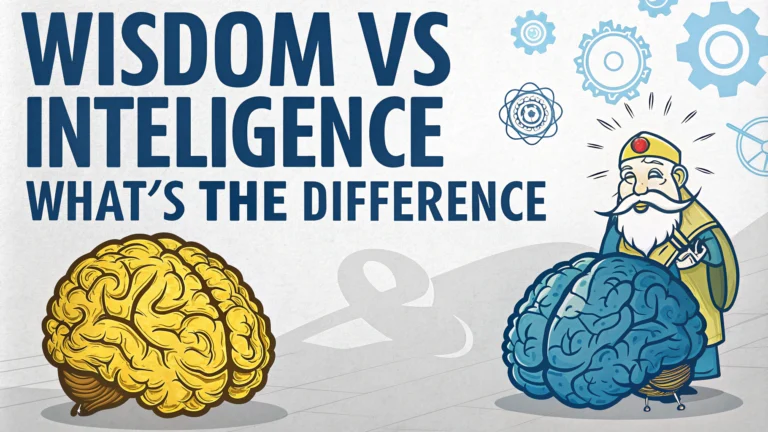The age-old debate between **wisdom** and **intelligence** shapes how we understand human capabilities and decision-making. These two distinct qualities, while often confused, serve different yet complementary roles in our lives.
While **intelligence** measures our ability to learn and solve problems, **wisdom** reflects our capacity to make sound judgments based on experience and understanding. This quick guide breaks down their key differences and shows how to develop both qualities.
Key Characteristics of Intelligence
- **Problem-solving** abilities and quick learning
- **Analytical thinking** and pattern recognition
- **Information processing** speed
- Ability to adapt to new situations
Intelligence focuses on cognitive processing and measurable mental abilities. It represents our capacity to understand complex concepts and apply knowledge effectively.
Understanding Wisdom’s Unique Traits
- **Experience-based** knowledge
- **Emotional intelligence** and empathy
- **Good judgment** in complex situations
- Ability to see long-term consequences
Wisdom emerges from life experiences and reflection. It combines knowledge with practical understanding and emotional awareness.
How Intelligence and Wisdom Work Together
| Intelligence | Wisdom |
|---|---|
| Processes information | Applies life lessons |
| Solves immediate problems | Considers long-term impact |
| Uses logic and analysis | Integrates emotions and reason |
Understanding how these qualities complement each other helps develop better decision-making skills and personal growth.
“Intelligence is knowing what to do; wisdom is knowing when to do it.”
Practical Ways to Develop Both Qualities
Building **intelligence** and **wisdom** requires different but complementary approaches. These strategies help strengthen both qualities for better decision-making and personal growth.
Developing Intelligence
- Practice **problem-solving** through puzzles and games
- Learn new skills or languages
- Read diverse materials and challenge assumptions
- Engage in **critical thinking** exercises
Cultivating Wisdom
- Reflect on past experiences and outcomes
- Seek feedback from mentors
- Practice mindfulness and self-awareness
- Study different perspectives and philosophies
Common Misconceptions About Wisdom and Intelligence
| Misconception | Reality |
|---|---|
| Intelligence equals success | Success requires both intelligence and wisdom |
| Wisdom comes only with age | Wisdom develops through reflection and learning |
| Intelligence can’t be improved | Both qualities can be developed over time |
Real-world Applications and Benefits
The combination of **intelligence** and **wisdom** enhances decision-making in professional and personal settings. Understanding when to apply each quality leads to better outcomes.
Professional Benefits
- Better **problem-solving** in complex situations
- Improved leadership and team management
- Enhanced conflict resolution abilities
- More effective strategic planning
Personal Benefits
- Stronger relationships and communication
- Better life choices and decision-making
- Increased emotional resilience
- Greater self-awareness
Building a Balance of Both Qualities
Finding the right balance between **intelligence** and **wisdom** creates a foundation for personal growth and success. This balance helps navigate life’s challenges with both knowledge and understanding.
“The art of life lies in a constant readjustment to our surroundings.” – Kakuzo Okakura
Practice these qualities daily through mindful decisions and continuous learning. Remember that both intelligence and wisdom work together to create better outcomes in all aspects of life.
FAQs About Wisdom vs Intelligence
General Questions
Q: What is the main difference between wisdom and intelligence?
A: Intelligence is the ability to learn, understand, and solve problems quickly, while wisdom is the ability to use knowledge and experience to make good judgments and decisions.
Q: Can you be intelligent without being wise?
A: Yes. Intelligence relates to mental capacity and processing ability, while wisdom requires life experience and good judgment. Many intelligent people may lack the experience-based insight that characterizes wisdom.
Q: Is wisdom always related to age?
A: Not necessarily. While wisdom often comes with age and experience, younger people can display wisdom through learning from others’ experiences and applying good judgment in their decisions.
Specific Knowledge Questions
Q: What are the key components of emotional intelligence vs wisdom?
A: Emotional intelligence includes:
- Self-awareness
- Social skills
- Empathy
- Self-regulation
While wisdom encompasses:
- Good judgment
- Experience-based insights
- Moral understanding
- Practical knowledge application
Q: How is IQ different from wisdom?
A: IQ measures specific cognitive abilities like pattern recognition, logical reasoning, and problem-solving speed. Wisdom involves applying knowledge effectively in real-world situations and making sound judgments.
Q: Can wisdom be measured like intelligence?
A: Unlike intelligence, which can be measured through standardized tests (IQ), wisdom is more difficult to quantify. Some researchers use assessments of decision-making, life satisfaction, and moral reasoning to evaluate wisdom.
Practical Application Questions
Q: How do wisdom and intelligence affect decision-making differently?
A: Intelligence helps analyze options and process information quickly, while wisdom guides better long-term decisions by considering consequences, morality, and past experiences.
Q: Which is more valuable in leadership: wisdom or intelligence?
A: Effective leadership typically requires both, but wisdom is often more crucial for:
- Strategic decision-making
- People management
- Conflict resolution
- Long-term planning
Q: How does wisdom improve emotional intelligence?
A: Wisdom enhances emotional intelligence by providing deeper understanding of human nature, better judgment in emotional situations, and improved ability to handle complex interpersonal relationships.
Q: Can artificial intelligence replicate human wisdom?
A: Current AI systems can process information and solve problems (intelligence), but cannot truly replicate wisdom, which requires human experience, emotional understanding, and moral judgment.
| Aspect | Intelligence | Wisdom |
|---|---|---|
| Source | Learning and cognitive ability | Experience and reflection |
| Measurement | Can be measured (IQ tests) | Difficult to measure |
| Development | Can be trained and improved | Grows through experience and time |



















